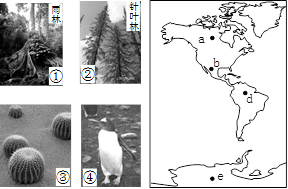读景观图和局部世界地图,完成小题:

小题1:景观图中,水热条件最好的是
A.①
B.②
C.③
D.④小题2:比较②、③景观图(两图所在的海拔高度相同)
A.②图所示区域的水热要比③丰富
B.②图所示区域的光照要比③丰富
C.②图所示区域的纬度要比③高
D.③图所示区域的植被比②丰富小题3:四幅景观图中,土壤厚度最大的是
A.①
B.②
C.③
D.④小题4:局部世界地图中的点与景观能正确匹配的是
A.a—①
B.b-②
C.d-③
D.e-④小题5:从d、b、a、e的景观变化,体现了
A.从沿海向内陆分异
B.垂直地分异
C.地方性分异
D.纬度地带分异
小题1:A
小题2:C
小题3:A
小题4:D
小题5:D
题目分析:
小题1:四幅景观图中,①处于热带地区处在赤道低压控制下,高温多雨。水热条件最好。
小题2:②处为亚寒带针叶林带景观,③处为热带荒漠带景观,两处海拔高度相同那么表明两地存在纬度差异才形成不同的水热条件。可推断出②图所示区域的纬度要比③高。
小题3:我们通常说的土壤厚度被称为腐殖层,是肥力性质最好的一层,植物根系和微生物也集中在这一层。四种景观中只有① 处热带雨林带腐殖层最厚。
小题4:根据美洲、南极洲的简图可知对应地点、景观是:a—②, b-③,d- ①,e-④。
小题5:d、b、a、e的景观变化是呈南北方向,体现了水平地域分异规律的赤道向两极的分异规律,呈纬度地带分异。
点评:本题以“景观图和局部世界地图”为载体,考查自然带与水平地域分异规律,难度一般。解答时需准确掌握不同世界自然景观的特征及地域水平分异规律。

